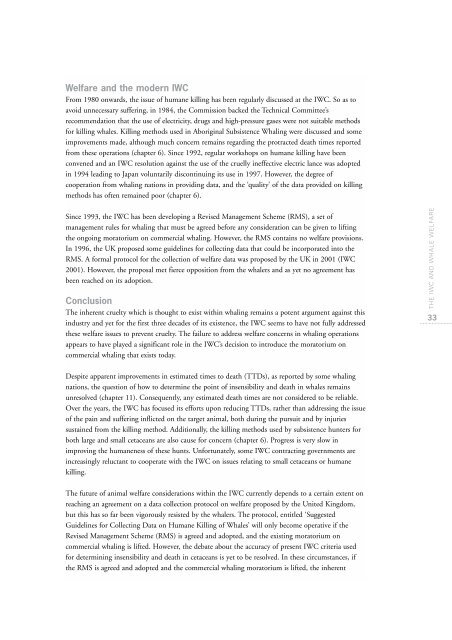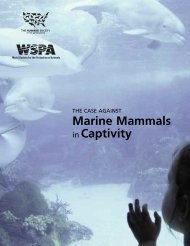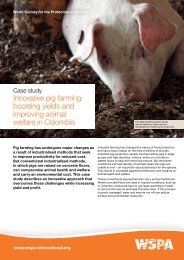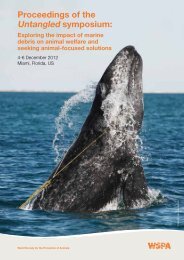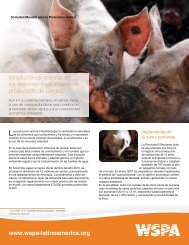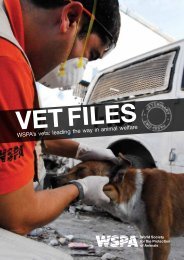TROUBLED WATERS - Whale and Dolphin Conservation Society
TROUBLED WATERS - Whale and Dolphin Conservation Society
TROUBLED WATERS - Whale and Dolphin Conservation Society
- No tags were found...
You also want an ePaper? Increase the reach of your titles
YUMPU automatically turns print PDFs into web optimized ePapers that Google loves.
Welfare <strong>and</strong> the modern IWCFrom 1980 onwards, the issue of humane killing has been regularly discussed at the IWC. So as toavoid unnecessary suffering, in 1984, the Commission backed the Technical Committee’srecommendation that the use of electricity, drugs <strong>and</strong> high-pressure gases were not suitable methodsfor killing whales. Killing methods used in Aboriginal Subsistence Whaling were discussed <strong>and</strong> someimprovements made, although much concern remains regarding the protracted death times reportedfrom these operations (chapter 6). Since 1992, regular workshops on humane killing have beenconvened <strong>and</strong> an IWC resolution against the use of the cruelly ineffective electric lance was adoptedin 1994 leading to Japan voluntarily discontinuing its use in 1997. However, the degree ofcooperation from whaling nations in providing data, <strong>and</strong> the ‘quality’ of the data provided on killingmethods has often remained poor (chapter 6).Since 1993, the IWC has been developing a Revised Management Scheme (RMS), a set ofmanagement rules for whaling that must be agreed before any consideration can be given to liftingthe ongoing moratorium on commercial whaling. However, the RMS contains no welfare provisions.In 1996, the UK proposed some guidelines for collecting data that could be incorporated into theRMS. A formal protocol for the collection of welfare data was proposed by the UK in 2001 (IWC2001). However, the proposal met fierce opposition from the whalers <strong>and</strong> as yet no agreement hasbeen reached on its adoption.ConclusionThe inherent cruelty which is thought to exist within whaling remains a potent argument against thisindustry <strong>and</strong> yet for the first three decades of its existence, the IWC seems to have not fully addressedthese welfare issues to prevent cruelty. The failure to address welfare concerns in whaling operationsappears to have played a significant role in the IWC’s decision to introduce the moratorium oncommercial whaling that exists today.THE IWC AND WHALE WELFARE33Despite apparent improvements in estimated times to death (TTDs), as reported by some whalingnations, the question of how to determine the point of insensibility <strong>and</strong> death in whales remainsunresolved (chapter 11). Consequently, any estimated death times are not considered to be reliable.Over the years, the IWC has focused its efforts upon reducing TTDs, rather than addressing the issueof the pain <strong>and</strong> suffering inflicted on the target animal, both during the pursuit <strong>and</strong> by injuriessustained from the killing method. Additionally, the killing methods used by subsistence hunters forboth large <strong>and</strong> small cetaceans are also cause for concern (chapter 6). Progress is very slow inimproving the humaneness of these hunts. Unfortunately, some IWC contracting governments areincreasingly reluctant to cooperate with the IWC on issues relating to small cetaceans or humanekilling.The future of animal welfare considerations within the IWC currently depends to a certain extent onreaching an agreement on a data collection protocol on welfare proposed by the United Kingdom,but this has so far been vigorously resisted by the whalers. The protocol, entitled ‘SuggestedGuidelines for Collecting Data on Humane Killing of <strong>Whale</strong>s’ will only become operative if theRevised Management Scheme (RMS) is agreed <strong>and</strong> adopted, <strong>and</strong> the existing moratorium oncommercial whaling is lifted. However, the debate about the accuracy of present IWC criteria usedfor determining insensibility <strong>and</strong> death in cetaceans is yet to be resolved. In these circumstances, ifthe RMS is agreed <strong>and</strong> adopted <strong>and</strong> the commercial whaling moratorium is lifted, the inherent


